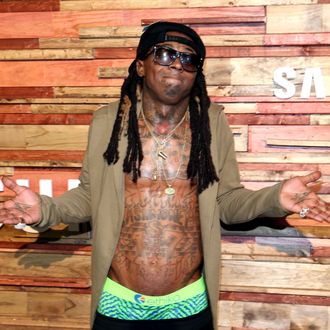
Update, August 3: Lil WayneÔÇÖs lawsuit against Universal Music Group has reportedly been put on hold until his other lawsuit, the one against Birdman over Cash Money (the manÔÇÖs got axes to grind), is sorted. According to the Jasmine Brand, because of the similarity between cases, the outcome of the Cash Money suit is expected to affect the situation with UMG, so a federal judge ruled that the latter is not to go forward until the former is resolved. Bottom line: If youÔÇÖre one of those unfortunate souls waiting eagerly for Tha Carter V, itÔÇÖs a good thing youÔÇÖre getting really good at the virtue of patience, because the Cash Money mess is expected to potentially drag on for another year.
Our original post from March 29 appears below.
Lil Wayne and his legal team filed a federal lawsuit against Universal Music and SoundExchange over unpaid profits, according to THR. The complaint claimed Wayne hadnÔÇÖt been compensated for finding and fostering such big-name artists as Nicki Minaj, Drake, and Tyga via Young Money ÔÇö millions of dollars of royalties Wayne signed for more than a decade ago have instead gone back to Universal to pay off alleged Cash Money debt. ÔÇ£Universal should be grateful and respectful to Lil Wayne for the millions of dollars in distribution fees and profits they have earned on the artists he brought to the company,ÔÇØ┬áWayneÔÇÖs attorney told the trade. In the suit, the rapperÔÇÖs attorneys asked for at least $40 million back, because they believe heÔÇÖs not responsible for Cash MoneyÔÇÖs problems.
WayneÔÇÖs Young Money offshoot is a joint venture tied to UniversalÔÇÖs Cash Money, but new talent profits were supposed to be split 51/49 between Cash and him, respectively. The suit noted, however, that ÔÇ£Universal has claimed a right to 100 percent of the label performance royalties attributed to [Young Money].ÔÇØ As a result, WayneÔÇÖs side said SoundExchange,┬áa nonprofit that deals in digital royalties, hadnÔÇÖt paid, either.
Aside from damages, the Young Money founder and CEO wants this battle, which comes not long after last yearÔÇÖs Cash Money drama, to yield a court ÔÇ£judgment declaring the partiesÔÇÖ respective rights with regard to [his] share of label performance royalties.ÔÇØ In response, a Universal spokesperson told Rolling Stone that the claims ÔÇ£are entirely without merit,ÔÇØ and that the distributor doesnÔÇÖt ÔÇ£intend to dignify this with further public comment, except to say that we will vigorously contest it and that the merits of our case will carry the day.ÔÇØ

